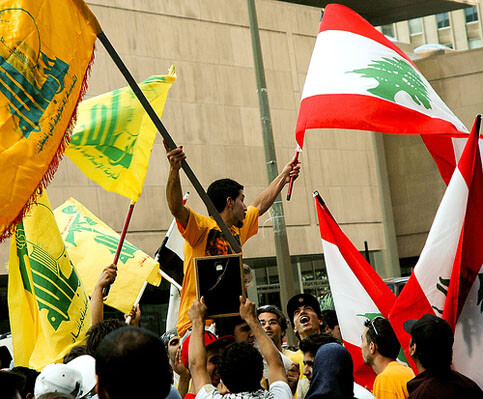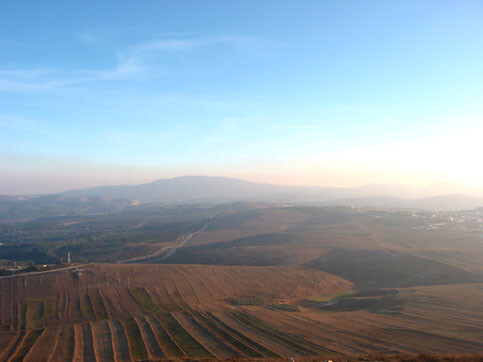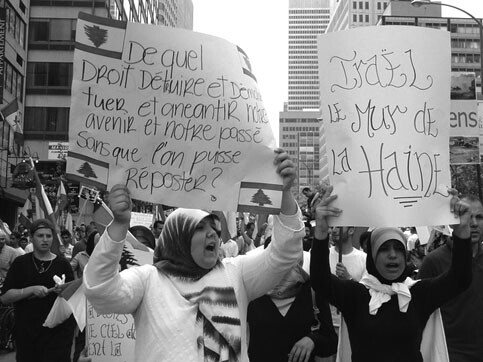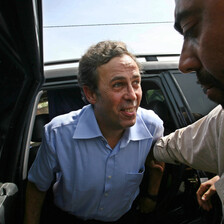The Electronic Intifada 13 January 2007
How Hezbollah became a terrorist organization in Canada

Demonstrators gather in downtown Montreal in August 2006 in support of the Lebanese resistance. [Photo: Rob Maguire]
Throughout much of the Arab world, Hezbollah is being celebrated as the champion that was, at long last, able to establish a victory over invincible Israel and its omnipotent western backers. In the Middle East, Hezbollah’s victory has energized movements against imperialism and its system of client regimes.
In Canada, Hezbollah is a terrorist organization. It is thus illegal to “participate in or contribute to, directly or indirectly, any activity” of this Lebanese political party or even to urge anyone to act in a way that could be construed as benefiting Hezbollah.
Some explanation for the distance between these starkly different approaches to the same organization can be found in the story of how Hezbollah’s political wing came to be placed on Canada’s list of terrorist organizations in December 2002. Examined in detail, this brief history provides insight into how key Canadian foreign policy decisions are made.
Hezbollah’s ideological roots lie in the 1970s “movement of the deprived,” which advocated for the rights of Lebanon’s historically marginalized Shi’a population and for all oppressed groups. In 1982, Israel invaded Lebanon, killing as many as 14,000 and wounding another 20,000-the vast majority of whom were civilians-in the first two weeks alone. Hezbollah emerged out of the popular Shi’a militias resisting the Israeli occupation and participating in the civil war, formally announcing itself in an open letter to “all the oppressed in Lebanon and the world,” published in 1985. The letter endorsed Khomeini and the Iranian revolution and proposed an Islamic state for Lebanon “which, alone, is capable of guaranteeing justice and liberty for all.” It was stipulated that this should be achieved only through the will of all the people, however, and not by force. “Confessional privileges [the domination of one religious group over others] are one of the principal causes of the great explosion which ravaged the country,” the letter noted. Since 1992, when the party first ran for national elections, Hezbollah’s leadership has publicly endorsed the importance of co-existence and pluralism within a multi-religious, diverse Lebanon and the vision of an Islamic state has faded into the background.
Today, Hezbollah is at once a political party with 14 seats in the Lebanese Parliament, the main provider of social welfare throughout the poor areas of Lebanon, a social movement voicing the aspirations of the Shi’a, and a fighting force. It receives financial and logistical support from Iran and political support from Syria and, lately, Venezuela. Its ideological underpinnings blend Lebanese nationalism, Islamism, social justice and pan-Arab nationalism.

The border line of Southern Lebanon. [Photo: Stefan Christoff, Electronic Intifada]
It would be a serious challenge to substantiate the claim made by Canadian Minister of Public Safety Stockwell Day; that the “stated intent of Hezbollah is to annihilate Jewish people.” An examination of official texts and speeches indicates, rather, that Hezbollah’s opposition to Israel is based on Israel’s history as a European colonial movement that occupied Arab lands, established an exclusionary state at the expense of the original inhabitants and has subsequently pursued a persistent pattern of settlement and expansion.
Hezbollah’s military operations wound down in 2000 with the end of the Israeli occupation of southern Lebanon, but a military wing was maintained on the grounds that Israel continued to violate the “blue line” established by the UN, illegally held Lebanese prisoners in their jails and occupied a tract of what Hezbollah considered to be Lebanese land in the Golan Heights.
By 2002, Canada had arrived at a typically Canadian, middle-of-the-road position: Hezbollah’s armed wing-the Hezbollah External Security Organization-was classified as a terrorist group, while its political wing was not.
A campaign to list the Hezbollah political party started in July 2002, when the government failed to include the party in an expanded list of designated terrorist organizations.
Pressure to list Hezbollah came from the Canadian Alliance Party (the precursor to today’s Conservative Party), senior Liberal politicians Irwin Cotler and Art Eggleton, B’nai Brith (a Jewish human rights organization, staunchly pro-Israel in orientation), and the Canadian Jewish Congress.
A series of articles by Stewart Bell published in the National Post-replete with terms like “terror suspects,” “clandestine cells” and “masterminds,” and based largely on information obtained from the Canadian Security Intelligence Service (CSIS), dating from the 1980s-documents the campaign. The National Post at the time was owned by ardent Zionist Israel Asper. Stewart Bell himself has been questioned about his role in CSIS’s practice of selectively leaking information to the media.
Denis Coderre, Minister of Immigration at the time, recently claimed to have played a role in the campaign as well. Indeed, the arrest and deportation of a supposed Hezbollah “agent” took place in October 2002, with accompanying media fanfare.
Interestingly, both Jean Chretien and Bill Graham, then Prime Minister and Minister of Foreign Affairs respectively, resisted placing Hezbollah on the terrorist list. Chretien met with Hassan Nasrallah, the secretary general of Hezbollah, in Beirut in October 2002. On November 28, a new set of groups was banned-and Hezbollah was still not among them. Irwin Cotler denounced the omission as “inexplicable and, given their [Hezbollah’s] murderous ideology, unconscionable.”
B’nai Brith responded the next day, on November 29, with a press conference in which they announced a lawsuit against the government, brought on the grounds that the government was failing to protect Canadians by refusing to ban Hezbollah.
The following day, November 30, the National Post picked up a story from the Washington Times claiming that, at a Beirut rally, Nasrallah had condoned and encouraged suicide bombing. Nasrallah was alleged to have said: “Suicide bombings should be exported outside Palestine”; and “I encourage Palestinians to take suicide bombings worldwide, don’t be shy about it.”
Two weeks later, after going to Beirut to investigate, CBC journalist Neil MacDonald exposed the story as a fabrication.
MacDonald traced the story to journalist Paul Martin. Martin had previously been accused of writing a false report about Palestinian militants under an alias in the same journal, the Christian-right Washington Times. MacDonald said that Martin, when challenged, “came up with three quotes [attributed to Nasrallah], one of which, to be charitable, was a gross mistranslation, and the other two were never even uttered.” Martin named his source for the quotes as Lebanese ultra-nationalist and pro-Israel Walid Phares, currently a Senior Fellow at the Foundation for the Defense of Democracies (FDD), whose board and advisors is composed of well-known neo-con Zionists. Phares has also contributed policy briefs to the publication of Daniel Pipes’s think tank, the Middle East Forum.
MacDonald reported on CBC on December 11 that, “Ottawa now knows that the Nasrallah quotes in the Washington Times about exporting suicide attacks were almost certainly never uttered.”
However, the alleged comments by Nasrallah had already received enough attention to force the government’s hand; a special Cabinet committee meeting was held the evening of December 10, 2002, in which it was decided to designate Hezbollah as a terrorist organization. The Canada Gazette, official newspaper of the government, reported, “The change has been made on the basis of the close connection between the organization as a whole and the Hezbollah External Security Organization, and the recent statement by Sheikh Hassan Nasrallah, the secretary general of Hezbollah, encouraging suicide bombings.”
Curiously, the decision came the same day as the high-profile arrest of “terrorist suspect” Mohamed Harkat under a security certificate, a top news story across the country which heightened public fear about terrorism. The security certificate was signed by Immigration Minister Denis Coderre on the recommendation of CSIS. The decision to arrest Harkat at this particular time may well have been taken independently of any other considerations. However, the timing of the arrest does not appear to have been linked to any exigencies in Harkat’s own case.

Lebanese demonstration against the 2006 Israeli attack on Lebanon in downtown Montreal. [Photo: Aaron Lakoff, Indymedia Quebec]
The political significance of labeling Hezbollah a terrorist organization is extensive: it is an act of tangible alignment with the apartheid state of Israel and its American backers, both regionally and in Lebanese internal politics; it is a stand against the right of Palestinian self-determination and the Palestinian right of return; and it is an affirmation of the double-standard under which Israel’s habitual disregard for international humanitarian law is tolerated. In Canada, the designation helps obviate the possibility of meaningful discussion about the causes of oppression and war in the region-witness the media storm around the visit by three members of Parliament to Lebanon in the aftermath of the Israeli assault, and around the participation of Quebec politicians in Montreal’s August rally against the attack on Lebanon. It also eviscerates the political potential of the large Lebanese diaspora community in Canada by threatening them with the terrorist label should they dare question the official line themselves.
No revision of the decision appears to have been made in light of the exposure of the Washington Times’ story.
Mary Foster is a Montreal based social justice activist, writer and member of Tadamon! Montreal. This article originally appeared in The Dominion newspaper in the fall of 2006.


